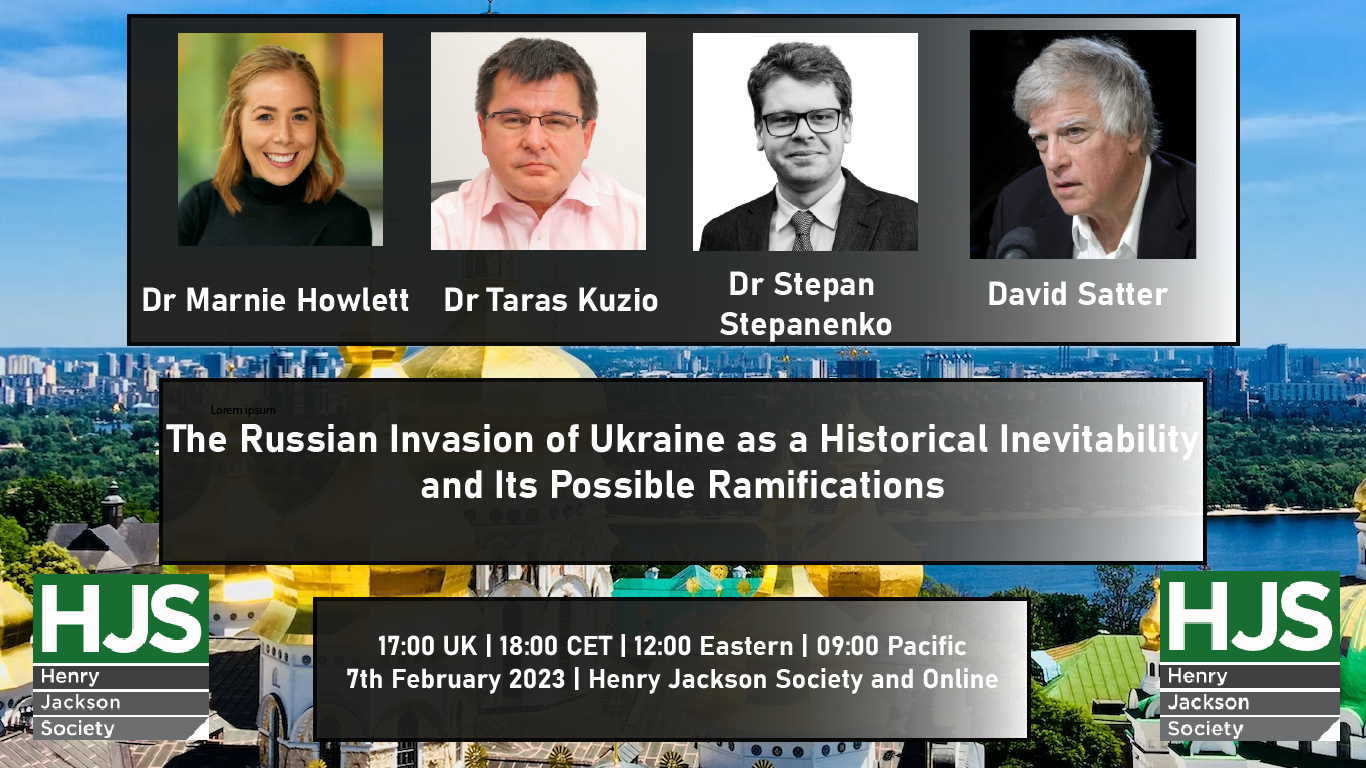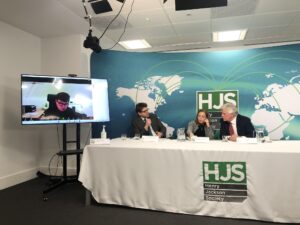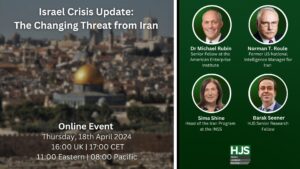The Russian Invasion of Ukraine as a Historical Inevitability and Its Possible Ramifications

- This event has passed.
The Russian Invasion of Ukraine as a Historical Inevitability and Its Possible Ramifications
7th February 2023 @ 5:00 pm - 6:00 pm

At different times, Russia has justified the invasion of Ukraine as a response to Ukrainian nationalism, Ukrainian genocide of Russians and NATO enlargement. With all reasons voiced by the Kremlin debunked over the past year, the ongoing war and lack of desire to end the war in Russia leaves the world wondering as to why there can still be public support for Russian brutality, how can it be stopped and what is the future for Russia.
Author and Journalist David Satter has spent his life reporting and analysing Russia and the Russian psyche. In a series of Wall Street Journal Articles he posits that the invasion of Ukraine was not the result of 21st century Russian politics but a historic trend of aggression towards neighbouring states by a country set on subjugation.
The Henry Jackson Society invites you to a debate with a distinguished panel of academics and authors to consider Satter’s thesis, the reasons for the Russian invasion of Ukraine and the possible repercussions of the war, drawing on centuries of Russian aggression and ramifications.

Dr Marnie Howlett is a Departmental Lecturer in Russian and East European Politics at the University of Oxford. She holds a PhD in International Relations from the London School of Economics and Political Science (LSE), a MA in Political Science, and a BA (High Honours) in International Studies from the University of Saskatchewan.
Dr Howlett’s research lies at the nexus of geopolitics, cartography, borders, and nationalism within the former Soviet Union, particularly Ukraine. She has conducted extensive fieldwork in the country analyzing the role of borders in shaping grassroots dynamics. Since the beginning of the Russia-Ukraine war, she has been working on several projects related to Ukrainian nation-building, including running two public opinion surveys in the country. Her main research interests also include the use of and ethics around qualitative methods for political science research.

Dr Taras Kuzio is a Professor in the Department of Political Science, National University of Kyiv Mohyla Academy. His previous positions were at the University of Alberta, George Washington University, and University of Toronto, International Institute of Strategic Studies, German Marshall Fund of the US and Foreign Policy Institute, School of Advanced International Studies, Johns Hopkins University.
Taras Kuzio holds a PhD in political science from the University of Birmingham, England, an MA in Area Studies (USSR, Eastern Europe) from the School of Slavonic and East European Studies, University of London, and a BA in Economics from the School of European Studies, University of Sussex. He held a Post-Doctoral Fellowship at Yale University.
Taras Kuzio is the author and editor of 24 books, including Russian Disinformation and Western Scholarship (2023); Fascism and Genocide: Russia’s War Against Ukrainians (2023); Russian Nationalism and the Russian-Ukrainian War. Autocracy-Orthodoxy-Nationality (2022); Ukraine’s Outpost: Dnipropetrovsk and the Russian-Ukrainian War (2021); Crisis in Russian Studies? Nationalism (Imperialism), Racism and War (2020); The Sources of Russia’s Great Power Politics: Ukraine and the Challenge to the European Order (2018); Putin’s War Against Ukraine. Revolution, Nationalism, and Crime (2017, 2019); Ukraine. Democratization, Corruption, and the New Russian Imperialism (2015); From Kuchmagate to Orange Revolution (2009); and Theoretical and Comparative Perspectives on Nationalism (2007). He is the author of five think tank monographs, including The Crimea: Europe’s Next Flashpoint? (2010). He has authored 38 book chapters and over 130 scholarly articles on Soviet, Eurasian, Russian, and Ukrainian politics, national identity, geopolitics, and international relations.
|

David Satter is a historian and former Moscow correspondent who has written five books on Russia and the Soviet Union. His most recent book is “Never Speak to Strangers and Other Writing from Russia and the Soviet Union.” He was expelled from Russia in 2013 becoming the only American journalist to be expelled from Russia since the end of the Cold War.
David’s latest article and a response by Leon Aron can be found here and here. It follows by David’s response.

Dr Stepan Stepanenko received his BA (Hons) and MA by research from the University of York and went on to complete a PhD at Ecole Pratique des Hautes Etudes of Paris Sciences et Lettres with a focus on Ukraine. In his academic career Stepan presented at a multitude of academic conferences and authored publications in peer reviewed journals, individually and in collaboration. He is also currently an Associate Member of the CNRS UMR 8167.
In British politics, Stepan has worked with the Conservative Party, running for election in the London Borough of Barnet in 2014 and co-founding the Conservative Friends of Ukraine in 2021. He continues to work on cross party humanitarian projects with a focus on Ukraine.
***
EVENT SUMMARY

The Henry Jackson Society was pleased to host an event with Dr Marnie Howlett, Dr Taras Kuzio, Dr Stepan Stepanenko, David Satter. David started off the discussion with why the war in Ukraine started. War is an ‘internal instrument’ in Russia’s foreign policy used to reinforce its power. Contrary to the belief that NATO expansion was the trigger for this war, Russia had designs on Ukraine long before Ukraine voiced its wish to join NATO. The US withdrawal from Afghanistan showed Putin that he could invade without the interference of the West especially since Ukraine withdrew its aspirations for a close US relationship. Taras Kuzio goes on to highlight the division in Ukraine between the Eastern-Slavic pro-Russia and the pro-Western Ukrainians. He points out that since the orange revolution, Putin sees Ukraine as a smaller Russia rather than an independent state and hoped that the invasion would quash anti-Russia sentiment, targeting Russian speaking areas to cleanse them of Ukrainian national identity which he views as fascist Western Imperialism. Marine Howlett, an ethnographer who did fieldwork in Ukraine, points out that the war didn’t come as a surprise to many Ukrainians and their desire as a country to pull away from Russia – many citizens regarding themselves Europeans posed a threat to Putin’s personal salience of empire reestablishment. The audience posed interesting questions on the role of the Russian Orthodox Church and the situation in Crimea.
#HJSEvents
RELATED EVENTS
The Return of the Oldest Hatred: Understanding Contemporary Antisemitism
Ever since the Hamas pogroms of October 7, 2023, which sparked the ongoing war in Gaza, there has been a huge rise in antisemitism in the United Kingdom. In the last … Continued
Israel Crisis Update: The Changing Threat from Iran
Iran’s recent attack against Israel saw it launching cruise and ballistic missiles as well as drones from its own soil, rather than relying on proxy forces. How should we understand the … Continued




